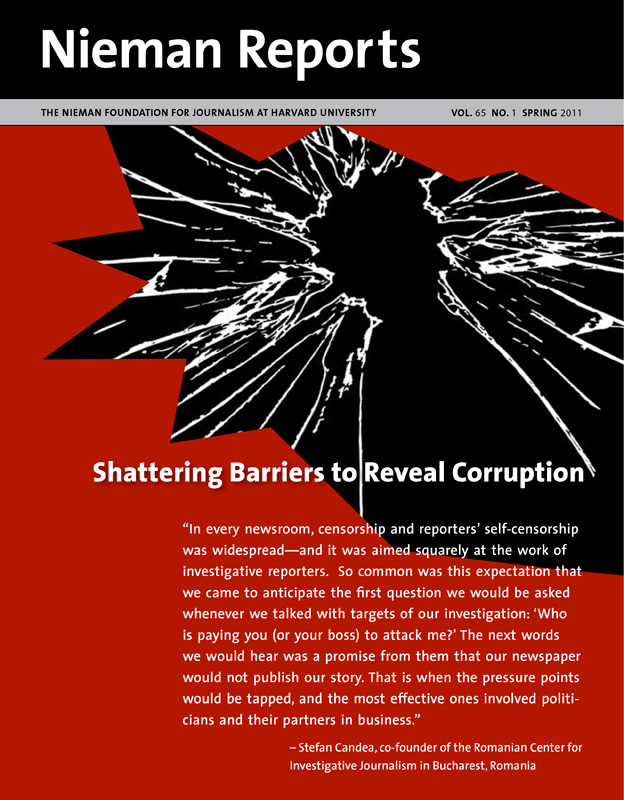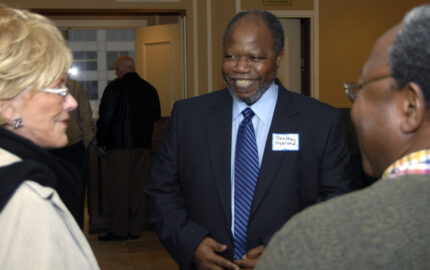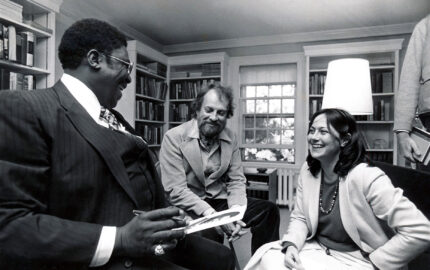
Extensive travel to Asia, Europe and elsewhere to produce the documentary “Sick Around the World” required journalism professor Jon Palfreman to take a term off from teaching. Photo courtesy of “Frontline.”
After a long career as a broadcast journalist working for the BBC and PBS, I had time when I became a Nieman Fellow to contemplate my future—and I concluded that it was precarious. As an independent documentary producer, I was competing each year for one of the increasingly scarce commissions at "Frontline," PBS's flagship current affairs program. Audiences and budgets were falling. Then a big documentary project I had been counting on fell through. So in 2006 toward the end of my Nieman year, on a whim, I applied for a job as a professor of broadcast journalism at the University of Oregon.
Over the course of two days on the campus, I was interviewed, gave a presentation to the faculty about my work, and was observed teaching classes. I was offered the job and I accepted. I wasn't sure if I would like university life or be successful in this challenging new world. I couldn't tell if this move marked the end of my professional career or a new chapter in it, but the University of Oregon seemed like a place where I could make a contribution and earn an honest living.
Job security in journalism has continued to plunge. According to the Pew Research Center's 2010 State of the News Media report, newspaper newsrooms have shrunk by a quarter in the last three years. Many journalists are looking longingly at the academy. Celebrated reporters, who once assumed they would finish their careers doing what they love, are weighing options such as teaching.
Practical Matters
You might think that the nation's j-schools would be lusting to hire seasoned journalists sporting Pulitzers, duPonts and Emmys. Journalism is a practical business so who better to inspire the next generation of journalists than a professional who has made it in the real world. But the view inside the academy is different. While professional success is admired and respected, other metrics influence faculty hiring, promotion and tenure. If you're planning to make the jump to university life, there are a few things to watch out for.
First, there is the issue of advanced degrees. Even the most accomplished professional journalist will have trouble landing a job at most colleges or universities without a master's degree. And in a disturbing and somewhat perplexing trend, job descriptions increasingly say, "PhD preferred." Fortunately, I had both degrees.
Then there is the issue of teaching experience. Since a big part of your job will be teaching students how to report, write, shoot and edit, faculty search committees want some evidence of your classroom skills. So it's a very good idea to try your hand at teaching. Out of curiosity, I had taught a few courses at Boston University and Suffolk University as an adjunct instructor. The money is meager—generally between $3,000 and $4,000—but working as an adjunct will reveal two things. You'll discover if you like teaching and you will learn (via student feedback) if you are any good at it.
Teaching, by the way, can be very rewarding. It's not just the satisfaction of giving back to the journalistic enterprise you love or the energizing experience of interacting with young people. It's also the intellectual pleasure that comes from designing courses, a process that forces the professional journalist to reflect on his craft.
Having a brilliant résumé, a master's degree, and some teaching experience should be enough to get you short-listed for an instructor vacancy. But the higher paying academic jobs are tenure-track positions requiring faculty to do research as well as teach. This is where things get complicated. In my interview for a tenure-track professorship, the skeptical questions did not focus on what I had accomplished, but rather what I planned to do after entering the academy.
Tenure-track jobs—which include assistant professors, associate professors, full professors, distinguished professors with endowed chairs, and deans—are the most sought-after faculty positions. A tenure-track faculty member is not only expected to teach, but also to generate a body of scholarly or creative work. Based largely on the quality of this body of work (usually completed over the first five or six years), the university or college will grant the new professor indefinite tenure—effectively a job for life—or ask him to leave.
The tenure system was designed for career academics, not seasoned professionals. A young PhD, appointed as an assistant professor in, say, philosophy, seeks tenure by publishing research in important peer-reviewed scholarly journals. Now how is this supposed to work for an award-winning investigative reporter? If she no longer works at The Washington Post or The New York Times, it isn't immediately clear how she will continue to demonstrate excellence by winning Pulitzers and find time to do the extensive research, reporting and writing required. My situation was similarly challenging. The documentaries I produce for "Frontline" are demanding undertakings—each requiring four to eight months of work and several weeks of travel, plus a brutal editorial review. How was I going to find time to do this while fulfilling my duties in the academy?
Tenure Strategies
I don't know how I convinced my interviewers to hire me, but the truth is that when I started teaching at the University of Oregon's School of Journalism and Communication, I had no clue how I was going to gain tenure. Initially, I focused on my teaching—normally five courses a year—and service obligations such as committee work. But like it or not, my tenure clock was ticking.
Talking to my j-school colleagues, a group that included several former professional journalists, I learned that there were various proven tenure strategies. Some faculty had won tenure by writing textbooks or scholarly articles about journalism. These routes did not appeal to me. But other colleagues had built their tenure cases by continuing to work as journalists, writing important magazine articles and trade books. By getting major pieces of work published by a nationally recognized magazine or book imprint, these professionals had survived an editorial process at least as grueling as academic peer review. Their portfolio not only demonstrated that they were still top-notch journalists but made them worthy of tenure.
So in the spring term of my first year, I approached my dean and told him that I was in discussions with "Frontline" to make a film about health care systems around the world. The catch: this would require a month-long filming trip to Japan, Taiwan, Germany, Switzerland and the United Kingdom in October so I would have to be relieved of teaching in the fall term. He graciously agreed.
The result was "Sick Around the World," the first of three "Frontline" programs I have produced since entering the academy. While it hasn't been easy to balance teaching, service and professional practice, it has proved very rewarding. These three programs not only formed the basis of my tenure case but also reaffirmed that I was still a working journalist—albeit a more financially secure one. Each year I teach five courses, serve on my share of committees, and spend the rest of my time pursuing my form of journalism. Thanks to the flexibility and understanding of my j-school colleagues, I have not only gained tenure but also fashioned a model where I can continue my journalistic career, which I am sure makes me a more interesting and credible role model to my students.
If you're thinking of applying for a job at a j-school, my advice is to decide whether you are doing so as a way to continue practicing journalism or as a means of escaping from it. If, like me, you see it as a means to continue the work you love, then I encourage you to apply. In today's competitive environment, you will certainly need not only a stellar résumé but also teaching experience and at least a master's degree. Yet your ultimate success in the academy will depend less on your celebrated professional past than on a vision of your journalistic future.
Jon Palfreman, a 2006 Nieman Fellow, is KEZI Distinguished Professor of Broadcast Journalism at the University of Oregon. A veteran of both U.K. and U.S. television, he has made more than 40 BBC and PBS one-hour documentaries including the Peabody Award-winning series "The Machine That Changed the World," the Emmy Award-winning NOVA program "Siamese Twins," and the Alfred I. duPont-Columbia University Silver Baton winner "Harvest of Fear."



